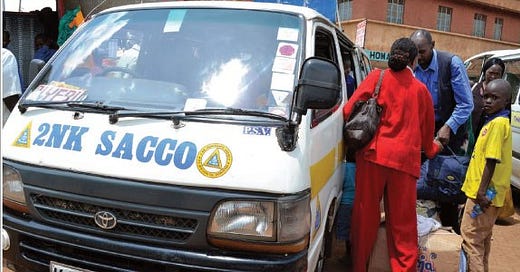🌯Inclusive FinTech Knowledge Bites [Week #58]
Rural Kenya SACCOs role as remittances cash pickups, Gender and income disparities halt in African financial inclusion and Beyond Banks: Bridging Financial Gaps in Emerging Markets
Hey,
I’m Hugo Pacheco, and this is The Barefoot Economist —a newsletter where, every week, I break down three essential stories on last-mile technology, emerging market innovation, and financial inclusion. Consider it your bite-sized takeaway to stay informed—sharp, insightful, and easy to digest.
This week on The Barefoot Economist:
💸 Rural Kenya Sacco role in Remmitances Cash Pickup Services
👩🏾 Financial inclusion in Africa: Tackling gender and income disparities
📲 How Agency Banking is Bridging Financial Gaps in Emerging Markets
Enjoy your reading!
💸 Rural Kenya Sacco Strategy for Cash Pickup Services

Credit Bank, Interswitch Kenya, and RIA are enabling selected SACCOs to facilitate both inbound and outbound remittances to reach customers in rural Kenya.
“SACCOs are the backbone of financial access in rural Kenya. By integrating remittance services with SACCO networks, we ensure even remote communities can receive funds conveniently” Credit Bank CEO Betty Korir
🌯 The Barefoot Insight
Overall, the case of Credit Bank Plc illustrates that a well-designed cash service combined with a strategic agent network distribution is essential for overcoming traditional barriers to financial inclusion. Focusing on cost reduction, geographic targeting, customer education, and multi-stakeholder partnerships, financial institutions can create resilient and inclusive financial ecosystems that drive tangible socio-economic growth Here is my take on the iniciative best practices:
Strategic Service LaunchFinancial institutions should explore hybrid models that combine digital solutions with traditional cash services, ensuring that innovation is accessible to even the most underserved communities.
Targeted Geographic PenetrationThe service's implementation across 14 Skyline SACCO branches in four counties opens up possibilities for targeted agent network strategies in places where operational costs of liquidity previously rendered them unviable. By conducting detailed geographic and demographic analyses to strategically expand agent networks. Use mapping tools to identify underserved regions and deploy agents where they will have the greatest impact on financial inclusion.

Competitive Cost StructureKenya’s average remittance cost stands at 10.72%, exceeding both the global average of 6.65% and the United Nations Sustainable Development Goal (SDG) target of 3%. Transfers from Uganda to Kenya cost 4.1%, while those from Germany reach 7.7%. Offering midmarket exchange rates between 2% and 4% not only lowers remittance costs but also positions the service as a cost-effective alternative to traditional remittance channels.
Enhanced Customer AccessibilityBy providing the option for instant cash withdrawals at any branch or direct deposit into accounts, the service reduces friction in receiving funds—a critical factor for rural customers who may not have reliable banking infrastructure.
Collaborative Ecosystem DevelopmentThe initiative’s support from key partners such as IFAD, Interswitch Kenya, and RIA underlines the importance of a collaborative ecosystem in scaling financial services.
Customer Empowerment through Education and Digital OnboardingComplementing the remittance service with financial literacy programs and digital onboarding (e-KYC via the Nyumbani Account) is critical for enhancing customer trust and usability.
💡 Liked it? Read the full article on Cashtech: How Fintech, Agent Networks, and the Resilience of Cash Unlock Digital Business Viability and learn the Boost Ghana e-commerce onramp strategy for turning delivery service drivers into Momo Agents.




